
The Generative AI Revolution in Real Estate: An In-Depth Analysis of the Top 20 Transformative Use Cases
The real estate industry, often seen as a traditional and slow-moving giant, is standing on the brink of its most significant transformation yet. The engine driving this change? Generative AI (GenAI). This isn’t just another tech trend; it’s a paradigm shift poised to redefine every aspect of how we design, build, market, manage, and invest in property. The numbers are staggering: McKinsey Global Institute projects that GenAI could inject between $110 billion and $180 billion in value into the sector.
This revolution is moving beyond simple automation. While older forms of AI could analyze data or classify information, GenAI creates. It can write compelling property listings, design innovative floor plans, and predict market trends with astonishing accuracy. This article will provide an in-depth analysis of 20 transformative use cases that are already reshaping the industry, offering a clear roadmap for what’s to come.
Section 1: Reimagining the Built World: GenAI in Property Development and Design
The very foundation of real estate—the process of creation and design—is being rebuilt from the ground up by generative AI. What once took months of manual effort can now be conceptualized and refined in a fraction of the time, leading to more innovative, efficient, and compliant projects.
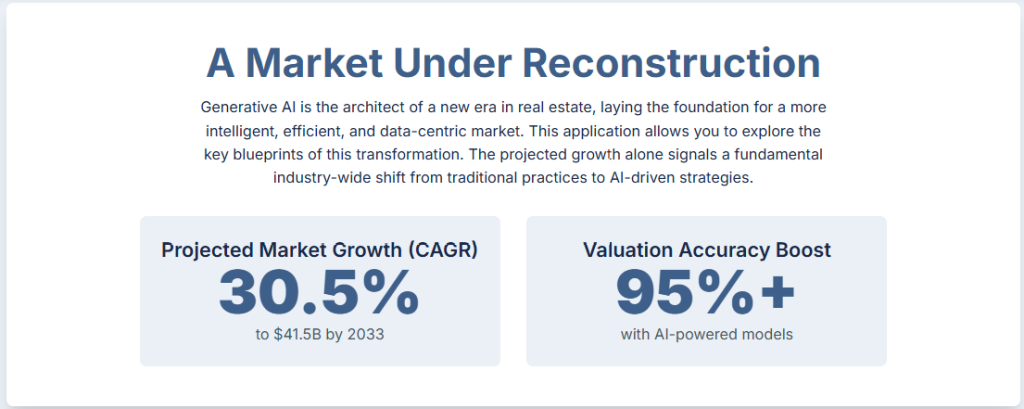
1. Generative Architectural Design
Imagine an architect describing a vision in plain English—”a five-story apartment building in a Scandinavian minimalist style with south-facing balconies and a green roof”—and instantly receiving dozens of photorealistic 3D renderings. This is the power of GenAI tools like Midjourney and DALL-E. They act as tireless creative partners, exploring unconventional ideas and accelerating the ideation phase from months to minutes.
2. Automated Floor Plan Generation
Creating optimized floor plans is a technical, time-consuming task. AI platforms like Maket and Architechtures can now generate hundreds of viable layouts based on specific constraints like room dimensions, adjacencies, and total area. This not only automates a repetitive task but also ensures maximum spatial efficiency, allowing developers to test feasibility at unprecedented speed.
3. AI-Driven Site Selection
The high-stakes decision of where to build is becoming a data-driven science. GenAI platforms can analyze vast, disparate datasets—zoning codes, traffic patterns, demographic shifts, and economic indicators—to identify undervalued land and pinpoint emerging hotspots. This augments human intuition with powerful analytics, reducing site analysis time from weeks to mere minutes.
4. Sustainable Design & Energy Modeling
As ESG (Environmental, Social, and Governance) criteria become paramount for investors, AI is a critical tool for building greener. Platforms like Autodesk Spacemaker can simulate various design scenarios to optimize for energy efficiency, solar exposure, and reduced carbon footprint. This data-driven approach helps developers meet regulatory demands and lower long-term operational costs.
5. Automated Regulatory & Zoning Analysis
Navigating the labyrinth of local zoning codes is a major bottleneck in development. GenAI can scan, interpret, and apply these complex regulations directly to design concepts, flagging potential compliance issues from day one. This de-risks the early stages of a project, preventing costly redesigns and delays down the line.
Section 2: Accelerating Transactions: GenAI in Marketing, Sales, and Leasing
In the competitive world of real estate sales, speed, personalization, and presentation are everything. Generative AI is providing agents and brokers with a powerful toolkit to create hyper-personalized customer experiences, optimize listings, and automate the top of the sales funnel.
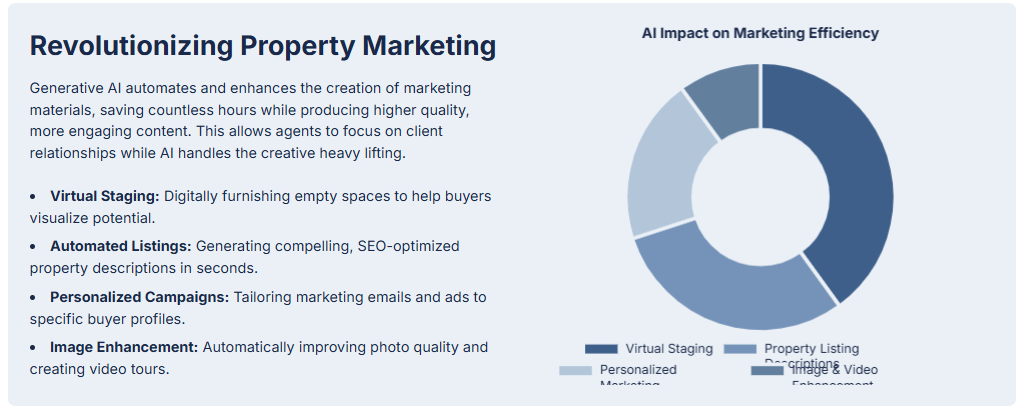
6. Hyper-Personalized Property Recommendations
Property search is moving beyond simple filters. AI recommendation engines, like those used by Zillow, analyze a user’s browsing history, clicks, and even chat interactions to suggest properties that match their unstated lifestyle preferences. This turns a tedious search into a curated, concierge-like experience, boosting engagement and lead conversion.
7. Automated Property Description Optimization
Writing compelling marketing copy for every single listing is a huge time sink for agents. GenAI tools can instantly craft engaging, persuasive, and SEO-optimized property descriptions from a basic list of features. This saves agents 30-60 minutes per listing and ensures high-quality, consistent content across the board.
8. Immersive Virtual Tours
GenAI can create realistic, interactive 3D virtual tours from 2D floor plans or a series of photos. This technology is a game-changer for attracting out-of-state and international buyers, allowing them to “walk through” a property from anywhere in the world. Properties with 3D tours not only see higher engagement but also tend to sell faster.
9. AI-Powered Virtual Staging
Physical staging is expensive and logistically complex. AI-powered virtual staging offers a revolutionary alternative, allowing agents to digitally furnish an empty space in countless styles. This can reduce staging costs by up to 97% and helps buyers visualize themselves in the home. Tools like REimagineHome can even show potential renovations, like a modernized kitchen.
10. Intelligent Lead Generation Chatbots
In an on-demand world, instant response is critical. AI chatbots can provide 24/7 support on websites, answering common questions, scheduling viewings, and qualifying leads by asking about budget and timeline. This ensures every inquiry is captured instantly, freeing up human agents to focus on high-intent, pre-qualified prospects.
Section 3: Optimizing Operations: GenAI in Property and Asset Management
The long-term value of a property is determined by how well it’s managed. Generative AI is transforming property management from a reactive, manual field into a proactive, data-driven discipline that enhances tenant satisfaction and boosts net operating income (NOI).
11. Predictive Maintenance
Instead of waiting for an HVAC system to fail on the hottest day of the year, AI uses data from IoT sensors and maintenance records to predict failures before they happen. This proactive approach can cut emergency repair costs by 14-30%, minimize downtime for tenants, and extend the life of critical building assets.
12. Smart Building Energy Management
AI acts as the central brain for smart buildings, dynamically adjusting lighting, heating, and cooling based on real-time occupancy, weather forecasts, and usage patterns. This intelligent optimization lowers utility bills, reduces the building’s carbon footprint, and helps owners achieve crucial sustainability goals.
13. 24/7 AI-Powered Tenant Support
Chatbots are becoming indispensable for handling routine tenant communications. Deployed on resident portals, they can instantly answer questions about rent payments, process maintenance requests, and provide information on building policies around the clock, significantly improving the tenant experience.
14. Automated Lease Abstraction
Commercial real estate portfolios are built on mountains of dense legal contracts. Manually extracting key data points is slow and prone to error. Using Natural Language Processing (NLP), AI can “read” and structure this information automatically. In one case, real estate giant JLL used this tech to reduce manual review by 60% and uncover over $1 million in missed revenue from escalation clauses.
15. AI-Enhanced Tenant Screening
Selecting reliable tenants is crucial for minimizing risk. AI can streamline the screening process by automatically verifying credit scores, rental history, and income, ensuring that fair and consistent criteria are applied to every applicant. This speeds up the leasing cycle and helps property managers select tenants who are less likely to default.
Section 4: Data-Driven Alpha: GenAI in Investment and Finance
For investors, alpha—or above-market returns—is the ultimate goal. Generative AI is providing powerful new tools to analyze markets, value assets, and manage risk with a level of speed and precision that was previously impossible, fundamentally changing how investment decisions are made.
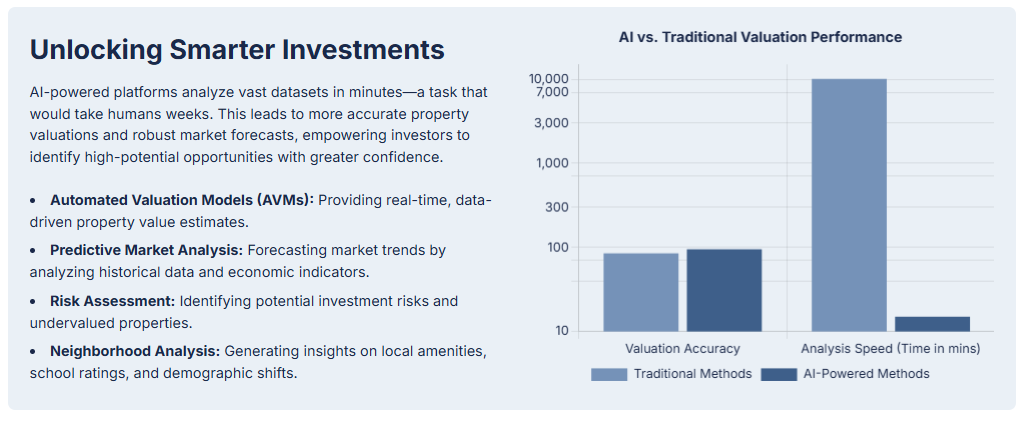
16. Advanced Automated Valuation Models (AVMs)
AI is supercharging AVMs like Zillow’s “Zestimate”. By analyzing vast datasets, including property images to assess condition, these models can provide more accurate and less biased valuations. They can even generate “synthetic comps” in areas with few recent sales, reducing valuation errors by up to 50% and speeding up transactions.
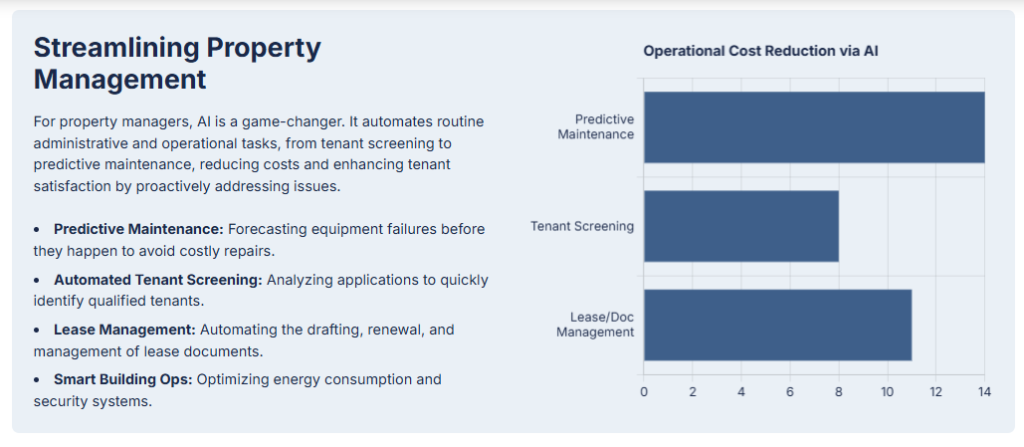
17. Predictive Market Trend Analysis
Beyond valuing a single property, GenAI can forecast broad market movements. By analyzing economic data, demographic shifts, and historical trends, these models can predict future price changes and rental demand. This gives investors forward-looking insights to optimize their strategies and identify emerging opportunities before the competition.
18. Portfolio Optimization and Risk Assessment
AI can run sophisticated “what if” simulations across an entire property portfolio to model the impact of events like interest rate hikes or local economic downturns. This enables asset managers to proactively identify vulnerabilities, enhance forecasting, and make more strategic decisions about which assets to buy, sell, or hold.
19. Automated Due Diligence
The due diligence process for acquisitions is notoriously document-heavy. GenAI can automate much of this work by extracting and summarizing key information from financial statements, environmental reports, and leases. This accelerates transaction timelines and helps prevent bad investments by flagging potential risks early on.
20. Streamlined Investor Relations
Communicating effectively with capital partners is key. GenAI can streamline the creation of investor presentations, financial reports, and marketing materials. AI-powered chatbots on investor portals can also provide instant answers to common questions, enhancing transparency and confidence.
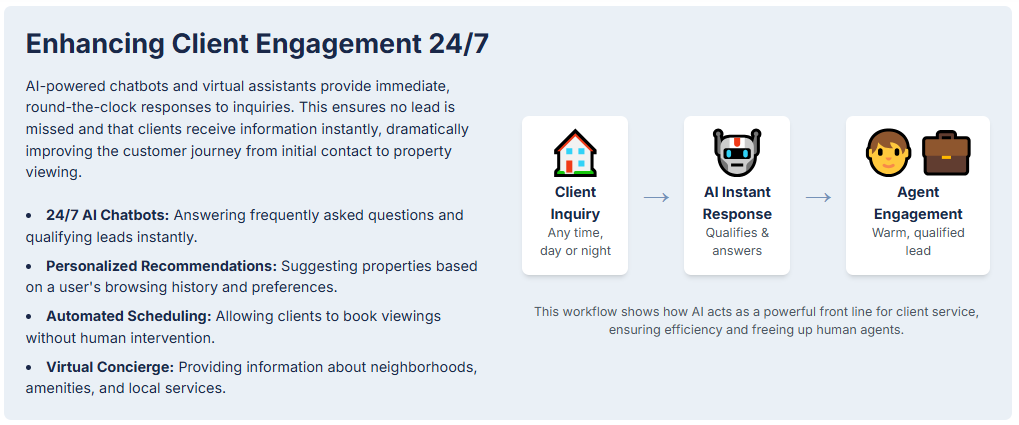
Navigating the AI Frontier: Strategy, Risks, and the Road Ahead
The promise of Generative AI is immense, but realizing its full potential requires a strategic approach. The foundation is high-quality, centralized data. Firms must break down data silos to feed their AI models with the clean, comprehensive information they need to generate meaningful insights.
This shift will also reshape real estate roles. The future is one of human-AI collaboration, where technology automates repetitive tasks, freeing professionals to focus on complex negotiations, strategic advisory, and client relationships. However, this power comes with significant risks that must be managed, including data privacy, algorithmic bias in valuations and screening, and the potential for AI “hallucinations” or inaccuracies.
Ultimately, the firms that will win in this new era are not just those that adopt the technology, but those that successfully navigate the cultural change that comes with it. The greatest barrier isn’t capital or code; it’s overcoming resistance to new ways of working. The future of real estate belongs to the agile, data-driven, and forward-thinking organizations that embrace this AI-powered future today.

